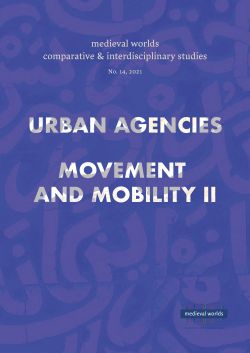Lorenzo M. Bondioli
S. 208 - 228
doi:
10.1553/medievalworlds_no14_2021s208
Verlag der Österreichischen Akademie der Wissenschaften
doi:
10.1553/medievalworlds_no14_2021s208
Abstract:
In the mid-eleventh century, Sicilian authorities levied the »Sicilian tithe«, a customs duty hitting foreign merchants. The imposition of this tax put in motion a long chain of events that would be lost to us were it not for the exceptional evidence of the Cairo Geniza. This article focuses on a handful of Geniza commercial letters and legal queries in Judeo-Arabic that chronicle the unfolding of the Sicilian tithe business, from the initial attempt by a group of Geniza merchants to evade it, through the harsh reaction of state authorities, to the eventual abolition of the tax through merchant lobbying at the Fatimid court in Egypt. The events surrounding the Sicilian tithe not only shed light on a chapter in the history of Islamic Sicily; they also offer fresh insights into the much broader question of the relationship between state and merchants in the Islamic Mediterranean of the Central Middle Ages. Addressing this theme, this article will advance three interrelated claims. First, it will argue that Sicilian state administrators adopted what we might call a protectionist fiscal policy with the aim of maximizing tax revenues while at the same time supporting a domestic merchant class. Second, it will show that to accomplish this goal state administrators categorized merchants on the basis of administrative procedures that were largely detached from the complex and shifting forms of identity that merchants themselves adopted. Third, it will argue that the state’s protectionist calculus clashed against the trans-territorial character of contemporary merchant consortiums, highlighting the fundamental misalignment between the tributary logic that animated state officials and the capitalist logic that animated merchants.
Cairo Geniza, Islamic Sicily, Fatimid history, medieval Mediterranean, commercial taxation, medieval economic history.
Published Online:
2021/12/01 11:03:50
Object Identifier:
0xc1aa5576 0x003d0812
Rights:All rights reserved.For questions regarding copyright and copies please contact us by email.
medieval worlds provides a forum for comparative, interdisciplinary and transcultural studies of the Middle Ages. Its aim is to overcome disciplinary boundaries, regional limits and national research traditions in Medieval Studies, to open up new spaces for discussion, and to help developing global perspectives. We focus on the period from c. 400 to 1500 CE but do not stick to rigid periodization.
medieval worlds is open to submissions of broadly comparative studies and matters of global interest, whether in single articles, companion papers, smaller clusters, or special issues on a subject of global/comparative history. We particularly invite studies of wide-ranging connectivity or comparison between different world regions.
Apart from research articles, medieval worlds publishes ongoing debates and project and conference reports on comparative medieval research.
Urban Agencies: Reframing Anatolian and Caucasian Cities (13th-14th Centuries)
Guest Editors: Bruno de Nicola and Matthew Kinloch
Preface
Matthew Kinloch and Bruno de Nicola
Reframing Medieval Anatolia, Caucasia, and the Aegean: Narratives, States, and Cities
Matthew Kinloch
Urban Agency and the City Notables of Medieval Anatolia
A. C. S. Peacock
Cities and Imperial Authority in the Western Provinces of the Byzantine Empire, 12th-14th Centuries
Teresa Shawcross
A Conceptual Account of Market Morals that Resonated in Medieval Anatolia under Christian and Muslim Rule
İklil Selçuk
Merchant Capital, Taxation and Urbanisation. The City of Ani in the Global Long Thirteenth Century
Nicholas S. M. Matheou
Looking for Urban Agency in a City of Memorials: Tomb Towers of Late-Thirteenth-Century Ahlat
Oya Pancaroğlu
Urban Agency in the Borderlands: Turkmen Rulers and Administrative Elites in 13th-century Kastamonu
Bruno De Nicola
“These are the narratives of bygone years”: Conquest of a Fortress as a Source of Legitimacy
Dimitri Korobeinikov
Movement and Mobility in the Medieval Mediterranean:
Changing Perspectives from Late Antiquity to the Long-Twelfth Century, II
Guest Editors: Christopher Heath, Clemens Gantner and Edoardo Manarini
The Sicilian Tithe Business: State and Merchants in the Eleventh-Century Islamic Mediterranean
Lorenzo M. Bondioli
"Eager to Go to the Desert": Ambiguous Views on Ascetic Women’s Holy Travels in Late Antiquity
Andra Jugănaru
Where the Long Way Ends: Descriptions of the Mediterranean Sea and Holy Land and the Criticism of Crusading at the Court of Henry II of England (1154-1189)
Fabrizio de Falco
Individual Articles
"I am a virgin woman and a virgin woman’s child". Critical Plant Theory and the Maiden Mother Conceit in Early Medieval Riddles
Alaric Hall and Shamira A. Meghani
Latin and Hebrew Analogues to The Old Norse Leek Riddle
Alaric Hall




 Home
Home Print
Print
 References
References
 Share
Share
